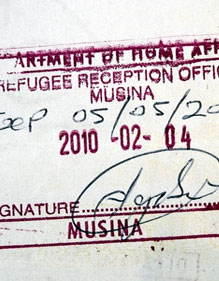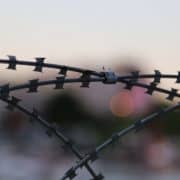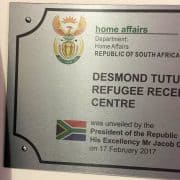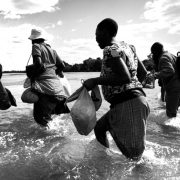|
Getting your Trinity Audio player ready...
|
 By Valencia Talane
By Valencia Talane
Seeking solutions to the problem of corruption at refugee reception centres seems to be an increasingly challenging task for many organisations working in the field of refugee and asylum seeker rights. Hundreds of cases of vulnerable asylum seekers are documented regularly by such organisations with the hope that a change in policy and centre systems will abate the high level of corruption that is associated with the Department of Home Affairs.
Although South Africa has the highest number of refugees and asylum seekers in the world – a notion shared freely by the government in dealing with issues on the subject, but highly disputed by Africa Check in an in-depth report a year ago – it only has three refugee reception centres across the country serving new applicants. These are located in Marabastad in Gauteng, Musina in Limpopo and Durban in KwaZulu-Natal.
Thousands of applicants fill these centres on a daily basis, causing a burden on a system that is already over-stretched. Corruption is most likely to thrive under these circumstances, and it does. Corruption Watch recently shared the story of Kazadi Mutombo*, a young man who challenged officials at the refugee reception centre in Gauteng after seeing their treatment of foreigners seeking asylum and refugee protection. Mutombo claimed it is an environment nuanced with illegal activity all over, where bribes open doors and speed up service delivery.
Describing how money ends up changing hands between asylum applicants and home affairs officials, Mutombo said: “They [officials] have got other foreigners that are sitting there around the office, you know people who know the language.
“They will send them, they speak to the guys on the side and say “give me R500”. And you can see the exchange of money, when they get the R500 inside again because it’s R1 500 in total, you give R500 to the guy inside, the other guy goes to his superior.” Mutombo claims that applicants pay R500 to jump the initial queue outside the centre building, R500 goes to the “interpreter” who is also a foreign national and R500 to the official serving the applicant.
“He hands the money to his superior and his superior does the thing. Those are the people that are moving fast, and I’m kind of looking at this.”
Mutombo called the police when he was assaulted by a security official following a complaint over disruption in the queue he had been standing in.
“The guard manhandled me and pushed me badly, as if to say ‘who are you to ask me’, he started yelling about people coming from other countries, and even called me a kwerekwere [a derogatory term for foreigners],” Mutombo told Corruption Watch. “I told him he mustn’t speak to me in that way.” Just as he thought the presence of the police officers would mean prompt service, he found himself back at square one as soon as they were gone. Not only was he not served, but Mutombo claimed to have also witnessed some nuanced communication of bribes in the corridors of the centre.
If you have the money, your application will be processed quickly
In a report published on Irin Africa, refugees claimed that after payment of a bribe, an “agent” would write a code on an applicant’s hand, which meant they didn’t have to wait in the queue but would be fast-tracked.
Refugees have alleged that corruption at the centre mentioned in the report is rife, saying a bribe of between R200 and R500 can get you to the front of the queue.
Civil society organisations have, however, lent a hand to exposing the appalling conditions experienced by refugees, in an effort to help change the situation for the better. Lawyers for Human Rights, People Against Suffering, Oppression and Poverty (Passop), and the Scalabrini Centre are just some of the organisations acting as safe havens for refugees seeking help. Brief summaries of each organisation as well as their contact details follow at the end of this article.
There is hope of justice
Home affairs officials seeking self-enrichment don’t always get away with their crime – there have been cases over the past few years where officials faced the music for transgressions involving refugees.
In June last year, the head of security at the refugee centre in Cape Town was fired after allegations of bribery were levelled against him. It was alleged at the time that the investigation into the man’s conduct was sparked by a home affairs supervisor seeing him take a bribe.
Many complaints about the centre have originated from the refugee community in the city, with several of them claiming that the expectation to bribe was an obstacle to getting efficient and speedy service.
Only a month after the story of the security head broke, another six members of staff were suspended from the same facility. These activities happened against the backdrop of built-up tension between officials and refugees who complained of bad service.
Organisations that can help
Lawyers for Human Rights – Refugee and Migrant Rights Programme (RMRP)
The RMRP was established in 1996 and is a specialist programme that advocates, strengthens and enforces the rights of asylum-seekers, refugees and other marginalised categories of migrants in South Africa.
The programme is made up of a team of eight lawyers, a social worker, two paralegals and two administrators who operate from its offices in Johannesburg, Pretoria, Durban and Port Elizabeth. It provides free legal services to indigent asylum-seekers, refugees and migrant clients. Litigation is used as a tool to advance their clients' rights and to develop African jurisprudence in the field of refugee and immigration law. The programme's litigation programme focuses on impact litigation with precedent-setting value.
Street address: 4th Floor Heerengracht Building, 87 De Korte Street corner Melle Street, Braamfontein
Telephone: +27 (0) 11 339 1960
Fax: +27 (0) 11 339 2665
Scalabrini Centre of Cape Town – Lawrence House project
Lawrence House is a special place of safety and care for abandoned and orphaned refugee children and unaccompanied foreign minors. The home is registered to accommodate 25 children, both boys and girls.
The children and youth currently living in Lawrence House are aged between eight and 19 years and are originally from six different African countries, namely Angola, the Democratic Republic of the Congo, Rwanda, Zimbabwe, Namibia and South Africa.
Street address: 47 Commercial Street, Cape Town
Telephone: +27 (0) 21 465 6433
Fax: +27 (0) 21 465 6317
African Centre for Migration and Society – ACMS
The ACMS is an independent, interdisciplinary and internationally engaged Africa-based centre of excellence for research and teaching that shapes global discourse on human mobility, development and social transformation. It's based in the School of Social Sciences at the University of the Witwatersrand. The ACMS is one of the continent’s leading institutions for research, teaching and outreach on migration.
Street address: Room 5, South West Engineering Building, East Campus, University of the Witwatersrand, Johannesburg
Telephone: +27 (0) 11 717 4033
Fax: +27 (0) 86 553 3328
E-mail: info@migration.org.za
People against suffering oppression and poverty – Passop
Passop was founded in 2007 by a group of Zimbabweans in response to increased tensions between Zimbabwean foreign nationals fleeing Robert Mugabe’s increasingly repressive regime and South African citizens who blamed them for crime and unemployment. Passop has since become a leading advocate for refugees and immigrants in their demands for human rights in South Africa. Passop is unique among similar South African non-profits in that it is an advocacy and activist organisation that draws the majority of its members and volunteers from the refugee community
Street address: 37 Church Street, Wynberg (corner of Main Road and Church Street), Cape Town
Telephone: +27 (021 762 0322
Fax: 086 517 6812
E-mail: office@p)assop.co.za
See more at: http://www.passop.co.za/contact-us
* Not his real name.









